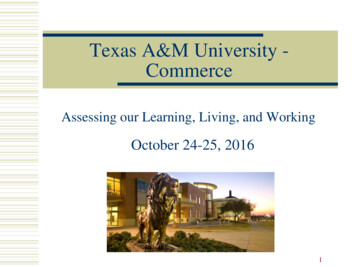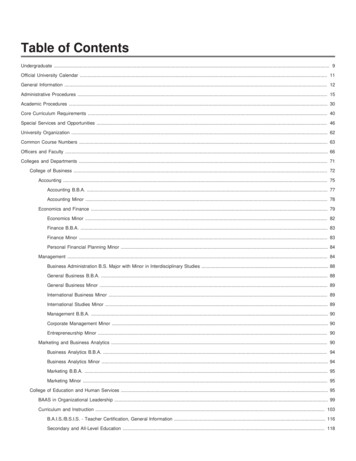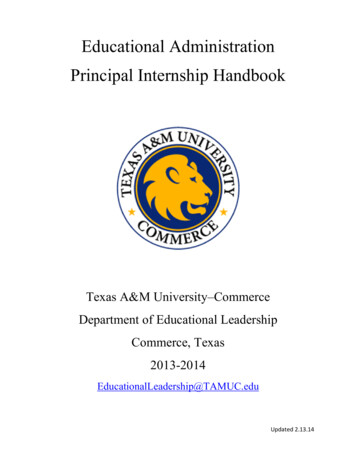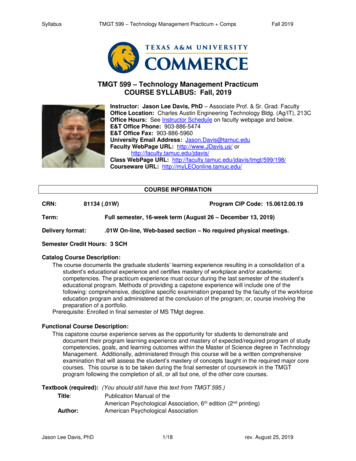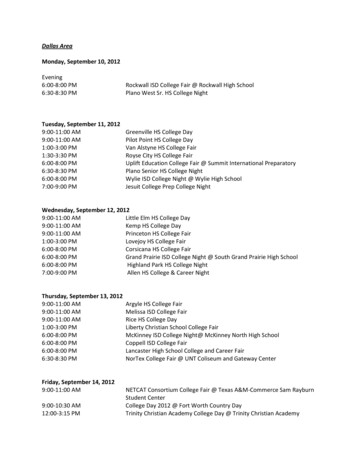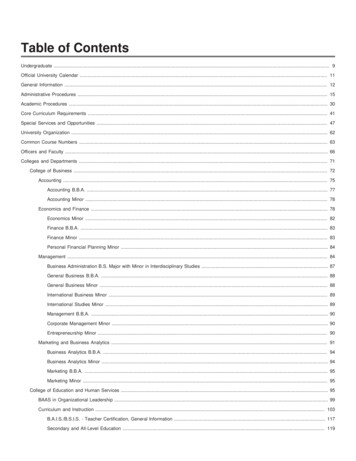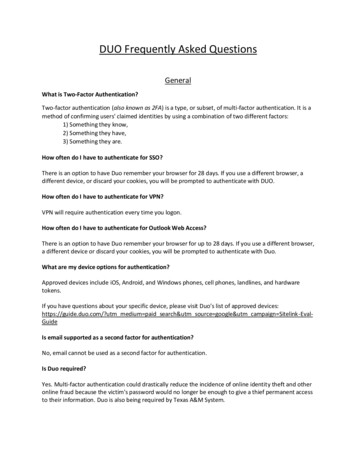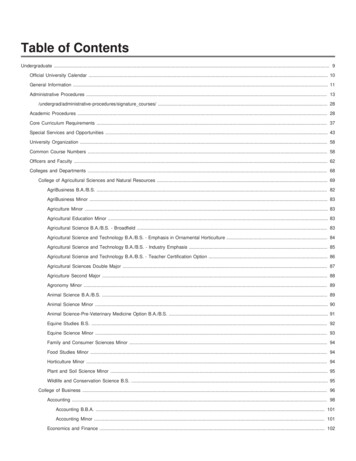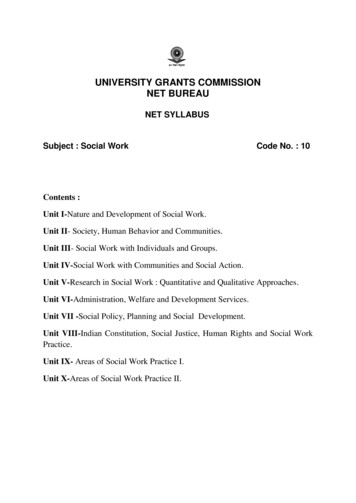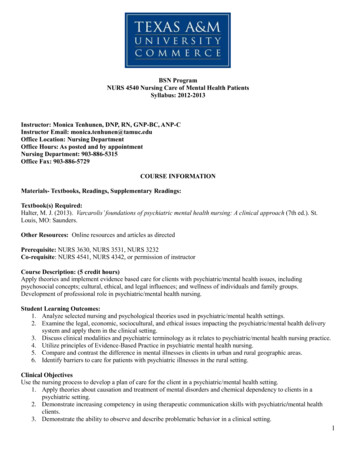
Transcription
BSN ProgramNURS 4540 Nursing Care of Mental Health PatientsSyllabus: 2012-2013Instructor: Monica Tenhunen, DNP, RN, GNP-BC, ANP-CInstructor Email: monica.tenhunen@tamuc.eduOffice Location: Nursing DepartmentOffice Hours: As posted and by appointmentNursing Department: 903-886-5315Office Fax: 903-886-5729COURSE INFORMATIONMaterials- Textbooks, Readings, Supplementary Readings:Textbook(s) Required:Halter, M. J. (2013). Varcarolis’ foundations of psychiatric mental health nursing: A clinical approach (7th ed.). St.Louis, MO: Saunders.Other Resources: Online resources and articles as directedPrerequisite: NURS 3630, NURS 3531, NURS 3232Co-requisite: NURS 4541, NURS 4342, or permission of instructorCourse Description: (5 credit hours)Apply theories and implement evidence based care for clients with psychiatric/mental health issues, includingpsychosocial concepts; cultural, ethical, and legal influences; and wellness of individuals and family groups.Development of professional role in psychiatric/mental health nursing.Student Learning Outcomes:1. Analyze selected nursing and psychological theories used in psychiatric/mental health settings.2. Examine the legal, economic, sociocultural, and ethical issues impacting the psychiatric/mental health deliverysystem and apply them in the clinical setting.3. Discuss clinical modalities and psychiatric terminology as it relates to psychiatric/mental health nursing practice.4. Utilize principles of Evidence-Based Practice in psychiatric mental health nursing.5. Compare and contrast the difference in mental illnesses in clients in urban and rural geographic areas.6. Identify barriers to care for patients with psychiatric illnesses in the rural setting.Clinical ObjectivesUse the nursing process to develop a plan of care for the client in a psychiatric/mental health setting.1. Apply theories about causation and treatment of mental disorders and chemical dependency to clients in apsychiatric setting.2. Demonstrate increasing competency in using therapeutic communication skills with psychiatric/mental healthclients.3. Demonstrate the ability to observe and describe problematic behavior in a clinical setting.1
4.5.6.7.8.9.10.11.Analyze clinical therapeutic modalities and their effectiveness with clients.Demonstrate professional standards of moral, ethical, and legal conduct.Assume accountability for personal and professional behaviors.Demonstrate professionalism, including attention to appearance, demeanor, respect for self and others, andattention to professional boundaries with patients and families as well as among caregivers.Provide appropriate patient teaching that reflects developmental stage, age, culture, spirituality, patientpreferences, and health literacy considerations to foster patient engagement in care.Implement evidence-based nursing interventions as appropriate for managing the acute and chronic care ofpatients and promoting health across the lifespan.Monitor client outcomes to evaluate the effectiveness of psychobiological interventions.Create and maintain a safe and effective therapeutic milieu that results in high quality patient outcomes.COURSE REQUIREMENTSInstructional / Methods / Activities AssessmentsThis is a blended course without lecture requiring students to complete online activities and independent studyto be successful. Course objectives may be met through individual study using suggested resources, activeinvolvement in classroom activities, formal, and informal exchange of ideas with classmates and colleaguesregarding specific topics as well as utilizing critical thinking skills. Teaching methods include seminar,discussion, small group work, independent study of texts and library resources, computer-assisted instruction,audio-visual aids, return demonstration, clinical assignments and supervision, post clinical conferences andcheck-off of appropriate skills and the assignments listed. While the professor will provide guidance andconsultation, the student is responsible for identification of learning needs, self-direction, seeking consultationand demonstration of course objectives.GradingGrades will be determined as follows:Grading Scale:A 90-100B 80-89C 75-79D 67-74F 66 and BelowA minimum grade of 75 is required to pass the course.The Course grade will be earned as follows:Exams (3-16% each)Online Case Studies (7-5% each)Online Quizzes (5-1% each)Group PresentationClass/Clinical Experience Paper (22% each)NCLEX Practice QuestionsHESI Practice/HESI ILSpecifics on course assignments for both class and clinical are in the assignments listed below. The HESIPsychiatric/Mental Health Exam must be passed with a score of 850 or greater. If you do not achieve this score, you willhave to undergo remediation and retesting as indicated in the Student Guide.2
The clinical component is PASS/FAIL and must be passed in order to pass the course. To receive a passing grade inclinical you must achieve at least 75% on the clinical assignments and receive a satisfactory clinical evaluation.TECHNOLOGY REQUIREMENTSThis course will be enhanced using eCollege, the Learning Management System used by Texas A&M UniversityCommerce. To login to the course, go to: http://leo.tamuc.edu/login.aspx.You will need your CWID and password to log in to the course. If you do not know your CWID or have forgotten yourpassword, contact Technology Services at 903.468.6000 or helpdesk@tamuc.eduThe following hardware and software are necessary to use eCollege.-Internet access/connection-high speed recommended (not dial up)-Word Processor (MS Word, or Word Perfect)Our campus is optimized to work in a Microsoft Windows environment. This means our courses work best if you areusing a Windows operating system (XP, Vista, 7 or 8) and a recent version of Microsoft Internet Explorer (6.0, 7.0, 8.0, or9.0).Your courses will also work with Macintosh OS X or better along with a recent version of Safari (5.1 is now available).Along with Internet Explorer and Safari, eCollege also supports the Firefox browser (3.0) on both Windows, and Macoperating systems.It is strongly recommended that you perform a “Browser Test” prior to the start of your course. To launch a browser test,login to eCollege, click on the “myCourses” tab, and then select the “Browser Test” link under Support Services.COMMUNICATION AND SUPPORTInteraction with Instructor Statement:It is expected that you will check your eCollege course and email at least DAILY for communication from the instructor.Communication between faculty and students is primary and taken seriously. Preferred communication methods areindividualized office hours, email, or via office phone. If a phone call is not answered please leave a message and send ane-mail using the direct e-mail link on the course home page. You will be treated with collegial respect and you areexpected to communicate likewise in a professional htmlCOURSE AND UNIVERSITY PROCEDURES/POLICIESCLASS1.Class Cancellation: In the event that a class is canceled, the student is expected to do the readings and completethe objectives for that day. The content will still be included on examinations. The material in this syllabus anddates identified in the Course Calendar are subject to change.2.Class attendance is expected. The students should notify course faculty in advance of any absence.3.Exam dates are listed in each course syllabus, and the student is expected to be present for exams. In the eventthat the student will be absent, the course instructor must be notified in advance. Failure to do so will result in thestudent receiving a zero for the missed exam or quiz. Review the university catalog for excused absence criteria.4.As an adult learner and responsible professional, the student is responsible for reading and completingassignments prior to class and for being prepared to participate in discussions over the assigned material. It shouldnot be expected that all material will be covered in class. Students are expected to come to class prepared.5.Assignments must be handed in on time. Assignments submitted late without prior arrangement with theclassroom instructor will receive a zero.3
NURSING SKILLS LABORATORY1.2.Students are responsible for assigned readings in textbooks and completing DVD and other assignments prior tolab. Participation in discussions over the assigned material is expected. Failure to prepare will result in anunsatisfactory for the lab session. All lab sessions must be completed satisfactorily to progress to the clinicalsetting.Students must adhere to the clinical dress code for skills laboratory sessions. Refer to the Nursing Student Guidefor policy information.CLINICAL EXPERIENCE1.2.3.4.5.6.7.8.9.Clinical attendance is mandatory. Refer to the Nursing Student Guide for absence policy information.Immunizations, CPR, and TB status must be current for students to be able to attend clinical experience at theassigned clinical location.Each student must pass a dosage calculation test with 90% or greater prior to administering medications inthe clinical setting. There will be two opportunities to achieve 90% or greater. Students who fail to attain 90% orbetter will be dismissed from the course.Students will be allowed to perform designated nursing skills in the clinical setting only after receiving instructionand successfully demonstrating the skill in the Nursing Skills Laboratory.Students are expected to meet clinical expectations outlined in the clinical evaluation tool.Based on student learning needs, the faculty will determine the appropriate amount of time and clinicalassignments needed to assess student growth. Faculty may require additional assignments and clinical work toensure students have met clinical objectives. Students are expected to comply with any additional assignments orclinical hours assigned.Students are expected to prepare for clinical practice in order to provide safe, competent care.Clinical assignments must be handed in on time to the clinical instructor. No exceptions.Clinical is graded Pass/Fail. If the student fails the clinical component, the entire course must be repeated.UNSATISFACTORY CLINICAL PERFORMANCE1.2.3.There are several infractions that might lead to a student being given a clinical warning for the day, including butnot limited to:AbsencesTardinessViolation of dress codeIncomplete health immunization recordsExpired CPR certificationFailure to turn in written assignments on timeIncomplete hospital orientationLack of preparationAccumulation of two (2) warnings in this clinical course will lead to failure of the clinical rotation and therefore,failure of the entire course.Other offenses which may lead to immediate failure of the course include but are not limited to:A pattern of lack of accountability for class, clinical and lab skills preparationUnsafe or unprofessional practices or behaviorsHIPPA violationsInability to pass required clinical assignmentsFalsification of recordsInability to achieve 90% on the dosage calculation exam4
ADA StatementStudents with Disabilities:The Americans with Disabilities Act (ADA) is a federal anti-discrimination statute that provides comprehensive civilrights protection for persons with disabilities. Among other things, this legislation requires that all students withdisabilities be guaranteed a learning environment that provides for reasonable accommodation of their disabilities. If youhave a disability requiring an accommodation, please contact:Office of Student Disability Resources and ServicesTexas A&M University-CommerceGee LibraryRoom 132Phone (903) 886-5150 or (903) 886-5835Fax (903) 468-8148StudentDisabilityServices@tamuc.eduStudent Conduct Code – Refer to the BSN Student GuideStudents must adhere to standards of professional and academic conduct Academic misconduct involves any activity thattends to compromise the academic integrity of the University, or subvert the educational process, including, but notlimited to, cheating, plagiarism, falsifying academic records, misrepresenting facts and any act designed to give unfairacademic advantage to the student or the attempt to commit such an act. Students are responsible for their own academichonesty and for reporting violations of academic honesty by others.5
COURSE OUTLINE / 462/17/1472/24/1483/3/14ContentCourse OverviewBasic Concepts/EffectiveCommunicationTheories &TherapiesLegal, Ethical ingAssignmentsVarcarolisSyllabusChapters 1, 3, 7(120-21), 35Class Meetings/Class Assignments/ExamsOrientation 1/14 @1230Facility Orientation 1/21 @0800Simulation 1/21 @1000Experience Paper due 1/24Chapters 2, 33Chapters 4, 5, 6Chapters 12, 3(applicable portion)Chapters 13, 3(applicable portion)Chapters 14, 3(applicable portion)Chapters 10, 15, 3(applicable portion)Class Meeting 2/6 @0800Quiz due 2/7Psychosis Case Study due 2/14Schizophrenia Case Study due 2/14Class Meeting 2/20 @0800Quiz due 2/21Exam 2/28 @0800Depression Case Study due 2/28Major Depression Case Study due 2/28Class Meeting 3/6 @0800Quiz due 3/7SPRING 14/14144/21/14154/28/14165/5/14Children &AdolescentsSuicideChapters 11, 34, 3(applicable portion)Chapters 25, 26PersonalityChapters 24, 3(applicable portion)Chapters 27, 28ViolenceAddictiveSexual assaultEatingFinals WeekChapters 22, 3(applicable portion)Chapters 16, 29Chapters 18, 3(applicable portion)ADHD Case Study due 3/21Class Meeting 3/27 @0800Quiz due 3/28Exam 4/4 @0800Class Meeting 4/10 @0800-Group 1 & 2Quiz due 4/11Alcoholism Case Study due 4/18Class Meeting 4/24 @0800-Group 3 & 4NCLEX Questions due in classExam 5/2 @0800Eating Disorders Case Study due 5/2Experience Paper due 5/2HESI Practice exam due 5/6HESI Exam 5/9 @08006
Lecture Assignments1.Examinations48% total, 16% each 2/28; 4/4; 5/2There are a total of three examinations in this class on the dates identified. They will cover all thetopics covered in class as of one week prior to the examination date. The examinations will include terminologyfrom the applicable chapters in the textbook. The questions will be in multiple formats: multiple choice, multipleanswer, matching, etc.2.Online Case Studies35% of grade, 5% eachThere are seven case studies to be completed and submitted either on Evolve or in the Dropbox by 2359 on thedate indicated. You will receive the score that you receive when you complete the case study.Evolve Case Study-PsychosisEvolve Case Study-SchizophreniaEvolve Case Study-DepressionEvolve Case Study-Major DepressionEvolve Case Study-ADHDEvolve Case Study-AlcoholismCase Study-Eating Disorders3.Online quizzes2/142/142/282/283/214/185/025%, 1% each2/7; 2/21; 3/7; 3/28; 4/11There are five quizzes on eCollege on the important terminology for the indicated modules. These are due by2359 on the date indicated.4.Group Presentation8%4/10 or 4/24Students will be divided into groups and each group will be assigned a theatrical movie that deals significantlywith a psychiatric or mental illness. The movies are all available for rental and/or streaming. They include: TheSoloist; Black Swan; Silver Linings Playbook; and Side Effects. Each member of the group is to watch themovie. As a group, describe what mental illness or illnesses were portrayed and if it was appropriate to the illnessbased on the accepted signs and symptoms of the condition. Analyze why you feel the changes were made or notmade to the illness for purposes of the movie. Discuss how this portrayal influences society’s view of psychiatricand mental illnesses. There is no paper for this assignment.The group will present informally to their classmates and lead a discussion with the following information on theassigned date:1.Summary of the movie, including illness in the movie2.Were the illness (es) portrayed accurately? Why and/or why not?3.Why were changes made, if any, for the movie?4.How does the movie influence society’s view of mental illness?This presentation is a group or team project. All members of the group receive the same grade, see grading rubricon eCollege. However, a student can be removed from his/her group if the other students in the group come to theinstructor and report that a student is not doing his/her fair share of the work. If that happens, the student will benotified in writing by the instructor. The student will then be responsible for doing the assignment on his/herown.5.Class/Clinical Experience Paper2%1/24Write a paper that includes the following: 1) Discuss at least three (3) aspects of the upcomingclass/clinical experience that you are looking forward to. Analyze what factors in theseexperiences make you feel positive about them; 2) Describe at least three (3) aspects of the7
upcoming class/clinical that you are most apprehensive or uncertain about. Analyze the factors inthese experiences that are influencing your reaction; 3) Identify at least three (3) SPECIFICactions you can take throughout the semester to reduce your apprehension or uncertainty.The paper should be no less than two (2) and no more than three (3) pages typed double spaced inAPA format. Place your name at the top of the first page. You do not have to have a title page orreference page. See grading rubric on eCollege. Submit it by 2359 on the due date on eCollege.6.Class/Clinical Experience Paper Evaluation2%5/2Write a paper that evaluates the results of your experience in class/clinical during the semester.Refer to the paper you wrote at the beginning of the semester. Analyze both the positive andnegative experiences you were expecting.The paper should be no less than two (2) and no more than three (3) pages typed double spaced inAPA format. Place your name at the top of the first page. You do not have to have a title page orreference page. See grading rubric on eCollege. Submit it by 2359 on the due date on eCollege.7.NCLEX Review QuestionsCr/NC4/24To assist in preparing students for the HESI examinations and the NCLEX examination, you are required tocomplete a total of 250 NCLEX questions related to psychiatric/mental health and/or therapeutic communicationduring the semester. NCLEX review questions must be taken via computer (CD-ROM or any other computerapplication) and must be completed and submitted as one grade. The printed form showing the score and thenumber of questions completed should be brought and shown to the classroom instructor on class days. Allquestions must be completed by April 24th.8.HESI Psych/Mental Health Practice ExaminationCr/NC5/6Complete online non-proctored exam by May 6th with a score of 90% or better to receive credit.9.HESI Psychiatric/Mental Health ExaminationCr/NC5/9Complete proctored exam on May 9th with a score of 850 or better to receive credit. If you receive below 850,you will have to complete remediation and re-take the examination to receive credit. For scores on the HESI of900-949, you will receive 1 extra point for your grade; for scores of 950-999, you will receive 2 extra points andfor scores of 1000 and greater, you will receive 3 extra points.Clinical Assignments1.Glen Oaks (PED, PROG, INT)Inpatient Assignments40%, 8% eachVariesa.On your schedule you have five (5) assigned days at Glen Oaks.b.The clinical will be from 0800-1500 with 30 minutes for lunch.c.Wear your uniform and name badge. Have your car keys, writing instrument and note paper in yourpockets. You can bring a lunch in to place in the refrigerator at the facility. EVERYTHING else remains in yourcar, this includes cell phones, clipboards, backpacks, etc.d.On your assigned unit, you will discuss with the nurse an appropriate client for you for the day. You willremain with this client throughout your clinical day. The activities, etc. the client attends you will also attend.During the day, you also have to participate in therapeutic communication activities with the client based on theclient situation.e.You have to complete a clinical journal for each of the days you are at Glen Oaks and submit it by 2359the day after the experience on eCollege. See grading rubric on eCollege. In addition, see below for additionalassignments for two of your days at Glen Oaks.8
f.One of the clinical days, you will need to complete a process recording of your clinical experience. Youhave to be in clinical at least two days at Glen Oaks BEFORE you can complete this assignment. This assignmentcan only be completed at Glen Oaks and the instructor has to be present for the client interaction. SeeJournals/Papers grading rubric on eCollege. The assignment is due by 2359 the day after the experience oneCollege.g.One of the clinical days, you will need to complete a comprehensive plan of care. You have to be inclinical at least two days at Glen Oaks BEFORE you can complete this assignment. This assignment can only becompleted at Glen Oaks and the instructor has to be present for the client interaction. See grading rubric oneCollege. The assignment is due by 2359 the day after the experience on eCollege.h.During these five clinical days (along with the day at Hunt), you need to have a client with the followingdisorder and/or perform the screening. One client can fit more than one category:Schizophrenia spectrumBipolarDepression screeningAnxiety/OCDFamily Interventions (on a child/adolescent client)Eating disorderAlcohol screeningSurvivor of violenceSuicide screening2.Hunt Regional Medical Center (PSY)8%Variesa.On your schedule, you will see one (1) day that you are assigned to PSY. This is the inpatient psychiatricunit at the hospital on the 5th floor.b.The clinical will be at the same times as your time at Glen Oaks. You have 30 minutes for lunch.c.Wear your uniform and name badge. Have your car keys, writing instrument and note paper in yourpockets. You can bring a lunch in to place in the refrigerator at the facility. EVERYTHING else remains in yourcar, this includes cell phones, clipboards, backpacks, etc.d.On the assigned unit, you will discuss with the nurse an appropriate client for you for the day. You willremain with this client throughout your clinical day. The activities, etc. the client attends you will also attend.During the day, you also have to participate in therapeutic communication activities with the client based on theclient situation.e.You have to complete a clinical journal (see grading rubric on eCollege) for the day you are at Hunt andsubmit it by 2359 the day after the experience on eCollege.Outpatient Assignments1.Heritage Program (HER)9%Variesa.On your assigned day, you are to arrive at the Heritage Program by 0715 to ride the buswhile the participants are picked up from their homes. Attend the programs/activities throughoutthe day as an observer, assisting the staff as needed. You will be done about 1400. Have yourattendance sheet signed at the facility.b.After your experience, complete a reflective journal (see outline/grading rubric on eCollege) about theexperience by 2359 the day after the experience and submit it along with your attendance sheet on eCollege.c.2.Heritage Program2904 Sterling Hart DriveCommerce, TX 75428Daybreak Program (DAY)9%Variesa.On your assigned day, you will meet at Glen Oaks at the regular pre-conference time of0800. After pre-conference, you will attend the program at Glen Oaks until post-conference.b.After your experience, complete a reflective journal (see outline/grading rubric on eCollege) about theexperience by 2359 the day after the experience and submit it on eCollege.9
3.Homeless (H1/H2)9%Variesa.You will be volunteering twice at a facility that assists the homeless or those at risk. Your day for yourfirst Grayson County Shelter experience is on the clinical schedule. You are to be there from 0900-1330. For thesecond 4-hour shift, you are to arrange while you are at the facility the first time for a day/time to return. ThisCANNOT be on Mondays or Tuesdays. It must be completed by April 29, 2013. Have your attendance formsigned on your second day and submit it along with your paper on eCollege.b.Use the below objectives to guide your experiences. For this assignment, you are to dress professionallyand wear your name badge.c.After you have completed all eight (8) of your clinical hours, you need to write a paper discussing thefollowing concepts related to the facility. Your paper should be no more than three typed pages in APA format,not including the reference page. You do not have to include a title page. See Journals/Papers grading rubric oneCollege. The paper is due by 2359, May 2nd on eCollege.4. Identify the critical health care needs of the clients served by your facility, focusing on mentalhealth issues. Discuss three aspects (psychobiological, social, economic, etc.) that affect the client’s ability toseek treatment for mental illness. List, in order of priority, five needs of this unique population. Relate three therapeutic communication skills most commonly used in relating to these clients. Analyze the statutory regulations of the Texas Mental Health Code and relate two of theseregulations to this client group.Court Observation (CT)a.7%VariesALL days for this assignment are on Tuesdays. On the day you are assigned to yourCourt Observation (CRT on the schedule), you are to do the following: Wear your uniform and name badge Go to:Collin County Mental Health CourtMedical Center of McKinney Wysong Campus130 N. Central ExpresswayMcKinney, Texas 75069 Arrive by 1315 on the 5th Floor. You will likely be there for about two hours. Attend the Mental Health Court and have your attendance form signed. Complete a maximum of two-page double spaced paper about your experience and turn it in oneCollege by 2359 the day after the experience along with your attendance sheet. See Journals/Papersgrading rubric on eCollege. Use the following questions to guide your submission. Describe the type of case(s), if any, which occurred while you were present along withthe outcome.Discuss what was most surprising to you about the process? Least surprising?10
5.6.Tour (TR)4/1a.On Tuesday, April 1st, ALL students will be having a tour of the Terrell State Hospitalstarting at 1000. After the tour, we will be returning to campus for a seminar on SuicidePrevention.b.You are to wear your uniform and name badge.c.For the tour, leave everything in your car except something to write with and a piece ofpaper for notes if you choose. NO cellphones, etc.d.Terrell State Hospital1200 East Brin StreetTerrell, TX 75160Support Groups7%5/2a.You are to attend a total of two (2) support groups during the semester. One of the groups has to befocused on alcohol and the other group on narcotics. It is recommended that you do NOT go to groups inthe town that you reside in. Due to the nature of these meetings, do not wear your uniform or namebadge. However, if you are asked, explain that you are a nursing student observing how various supportgroups assist clients with their overall well-being. ONLY ONE STUDENT CAN ATTEND ASUPPORT GROUP AT ANY ONE TIME-YOU CAN’T GO TOGETHER TO THE MEETINGS.b.For each group meeting, in the paper, name the group, indicate the location where youattended, the date attended, the length of time the group met and the purpose of eachsupport group. For each group meeting, the paper should be no longer than one (1)typed double spaced page. See grading rubric on eCollege. All papers are due by 2359, May 2nd. Usethe following to guide your paper. Relate the function of the support group to three psychiatric principles utilizing concepts fromyour text on Self-help Groups Analyze the group functions: 7.Discuss what you learned by attending the court that you will be able to use in yournursing practice. Be specific.Did it meet the general criteria of a group?Did it provide support for the members?Were all members involved?What was the NATURE of the support offered?Was there a designated leader? If so describe the role of the leader.What did you learn about this support group that can be used in your practice?Simulation Day Reflection Journal (SIM)5%4/22The purpose of this assignment is to provide the students an opportunity to reflect on their experiences during thesimulation day. Complete the simulation effectiveness tool (posted on eCollege, along with grading rubric) and inthe comment area reflect on your experience. It is due by 2359 the day of your simulation experience and is to besubmitted on eCollege. This is ONLY required on the 4/22 simulation day.11
8.Group Paper6%4/25You will be a member of a group investigating therapies used in the treatment of mental illness(Equine, Music, Recreation, Animal). Locate a provider of the therapy in the Northeast Texasarea. Contact them for a tour/interview about their services.For your tour/paper:Discuss what the therapy involvesIs there evidence that the therapy is effective? If so, how. If not, should there be.Discuss how the therapy could be implemented for the following individual:33 year-old African-American female with bipolar disorder and depressionIndicate in the paper the provider you located, the day of your visit/interview and theindividual you interacted with.The paper should be two-three pages (not including the title page or reference page) inlength in APA format. See grading rubric on eCollege. It is due by 2359, April 25th.This paper is a group or team project. All members of the group receive the same grade. However, a student canbe removed from his/her group if the other students in the group come to the instructor and report that a student isnot doing his/her fair share of the work. If that happens, the student will be notified in writing by the instructor.The student will then be responsible for doing the assignment on his/her own.9.Clinical EvaluationCr/NCEnd of semesterYou will be evaluated by your clinical instructor at the end of the semes
Use the nursing process to develop a plan of care for the client in a psychiatric/mental health setting. 1. Apply theories about causation and treatment of mental disorders and chemical dependency to clients in a psychiatric setting. 2. Demonstrate increasing competency in using therapeutic communication skills with
